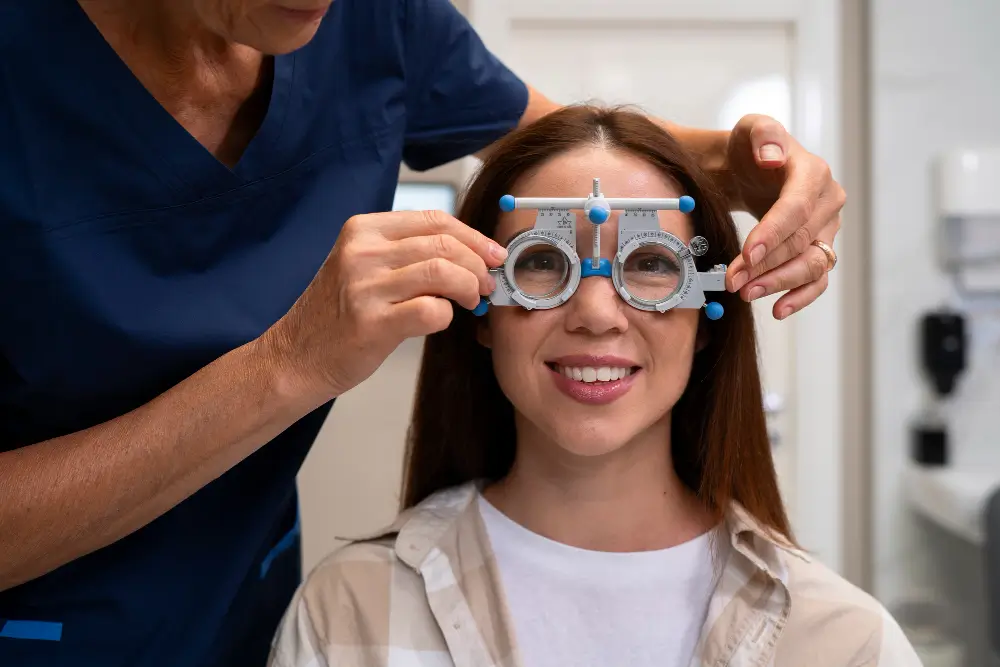If you’re dealing with blurry vision, eye strain, or simply need a new pair of glasses, you might wonder: Should I see an optometrist or an ophthalmologist? Although the two titles are often confused, they refer to very different eye care professionals. Understanding who does what can save you time, money, and even preserve your vision in the long run.
Optometrist vs. Ophthalmologist: What’s the Real Difference?
| Aspect | Optometrist (OD) | Ophthalmologist (MD or DO) |
|---|---|---|
| Education | Doctor of Optometry | Medical Doctor with ophthalmology residency |
| Focus | Primary vision care and correction | Full eye disease management and surgery |
| Performs Surgery | No | Yes |
| Prescribes Medications | Limited (basic eye conditions) | Full (for complex eye diseases) |
| Diagnoses Diseases | Can detect and refer | Can diagnose and treat |
Optometrists are trained to perform eye exams, detect refractive errors, and prescribe corrective lenses. They also provide vision therapy and identify early signs of eye diseases. Ophthalmologists, on the other hand, are licensed physicians who can treat serious eye conditions, prescribe a full range of medications, and perform surgery.
Your vision, our priority—Book your eye exam with a Bronx optometrist today!
What Services Does an Optometrist Provide?
Optometrists are the first line of defense for your vision. Here’s what they do:
- Comprehensive eye exams
Evaluate visual acuity, eye alignment, intraocular pressure, and overall eye health. - Lens prescriptions
Help correct vision issues like nearsightedness, farsightedness, and astigmatism. - Vision therapy
Involves exercises and tools for issues like amblyopia, convergence insufficiency, or eye fatigue. It may include computer-assisted training or prism lenses. - Patient education
Guidance on screen time habits, contact lens hygiene, and vision ergonomics. - Disease detection
Optometrists can spot early warning signs of glaucoma, diabetic retinopathy, and macular degeneration—and refer patients to an ophthalmologist when necessary.
What Can Ophthalmologists Do That Optometrists Can’t?
As medical doctors, ophthalmologists offer advanced care for the most serious eye conditions. They can:
- Perform eye surgery
Including LASIK, cataract removal, retinal detachment repair, corneal transplants, and more. - Prescribe specialized medications
For infections, inflammation, and chronic conditions like glaucoma or uveitis. - Manage complex eye diseases
Such as diabetic retinopathy, age-related macular degeneration (AMD), optic neuritis, and ocular tumors. - Handle medical emergencies
Like sudden vision loss, eye trauma, or systemic diseases with ocular impact (e.g., hypertension or diabetes).
When Should You See Each Type of Eye Doctor?
Here’s how to decide who you need:
Visit an optometrist if you:
- Need a vision exam or glasses/contact lens prescription
- Have eye strain, fatigue, or blurred vision
- Are managing minor refractive errors
Visit an ophthalmologist if you:
- Have sudden or severe vision changes
- Experience intense eye pain or eye trauma
- Have a history of eye disease or systemic health issues like diabetes
- Need surgical intervention or advanced diagnostic tests
In many cases, both professionals work together. For example, an optometrist may provide the initial assessment and refer you to an ophthalmologist for specialized treatment or surgery. This collaborative approach ensures you receive complete and personalized eye care.
Meet Your Eye Care Expert in the Bronx
At Perry Avenue Family Medical, your vision is in good hands with Dr. Anthony Martinez, a board-certified optometrist with expertise in:
- Glaucoma management
- Dry eye diagnosis and treatment
- Pre- and post-operative care
- Pediatric and adult visual therapy
- Personalized lens fittings
Dr. Martinez is passionate about helping patients achieve long-term eye health through compassionate, science-based care.
📍 Address: 3071 Perry Avenue, Bronx, NY
📞 Phone: (718) 231-6700
📧 Appointments: [email protected]
🕘 Hours: Monday–Friday, 9:00 AM – 6:00 PM
Frequently Asked Questions (FAQs)
Who is more qualified: an optometrist or an ophthalmologist?
Both are highly trained, but ophthalmologists hold medical degrees and perform surgery. They handle more complex medical conditions.
Can optometrists prescribe medication?
Yes, for basic eye conditions. For advanced diseases or chronic infections, a prescription from an ophthalmologist is necessary.
Should I see an optometrist first?
Absolutely. They can handle most routine eye care and will refer you if specialized treatment is needed.
Can an optometrist diagnose glaucoma or retinopathy?
They can detect early signs but cannot fully diagnose or treat these conditions. You’ll be referred to an ophthalmologist for further care.
Who performs the most thorough eye exams?
Optometrists conduct comprehensive vision assessments. However, if disease is suspected, ophthalmologists will follow up with more advanced diagnostic tools.

Related Articles
Want to learn more about eye care and related conditions? Check out these helpful resources:
- Contact Lens Eye Infection Symptoms You Should Never Ignore
- Can Dry Eyes Cause Blindness? What You Need to Know to Protect Your Vision
- How Can an Optometrist Treat Pink Eye?
- Vision Care 101: Protecting Your Family’s Eye Health
Final Thoughts
Your eyes deserve expert care. Whether you need a simple vision test or advanced eye treatment, understanding the roles of optometrists and ophthalmologists helps you make informed decisions.
If you’re in Bronx, NY, and looking for high-quality, compassionate eye care, schedule an appointment with Dr. Martinez at Perry Avenue Family Medical.
👁 Protect your vision today—because seeing clearly is living fully.
Sources
- Schleiter, K. E. (2010). Ophthalmologists, optometrists, and scope of practice concerns. AMA Journal of Ethics, 12(12), 941-945.
- Stein, J. D., Kapoor, K. G., Tootoo, J. L., Li, R., Wagner, A., Andrews, C., & Miranda, M. L. (2018). Access to ophthalmologists in states where optometrists have expanded scope of practice. JAMA ophthalmology, 136(1), 39-45.
